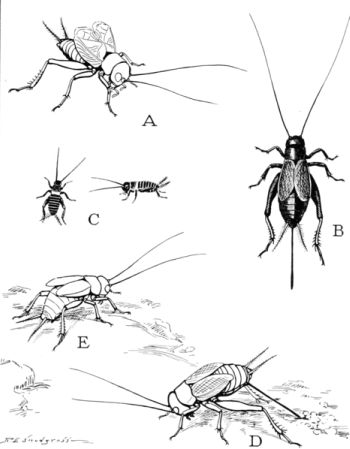April 24
Posted by sydney on Apr 24th, 2009

Stages of the field cricket, from Insects, Their Ways and Means of Living (1930), R.E. Snodgrass.
- 1793: April 24, 1793 – When Thomas got up to brew at four o’ the clock, he heard some stone-curlews pass by over the house in their way to the uplands. In the evening they flie over the village downwards, towards the brook, & meadows, where they seem to spend the night.
- 1790: April 24, 1790 – Planted potatoes & beans in the meadow-garden. Much thunder & hail at Alton.
- 1788: April 24, 1788 – Grass-hopper lark whispers. Cowslips blow.
- 1787: April 24, 1787 – Nep. Ben White left us.
- 1784: April 24, 1784 – Planted ten rows of potatoes against the Wid: Dewye’s garden. Planted one in the best garden. John Carpenter buys now & then of Mr Powlett of Rotherfield a chest-nut tree or two of the edible kind: they are large, & tall, & contain 60 or 70 feet of timber each. The wood & bark of these trees resemble the oak; but the wood is softer & the grain more open. The use that the buyer turns them to is cooperage; because he says the wood is light for buckets, jets &c. & will not shrink. The grand objection to these trees is their disposition to be shaky; & what is much worse, cup-shaky: viz: the substance of these trees parts like the scales of an onion, & comes out in round plugs from the heart. This, I know, was also the case with those fine chest-nut-trees that were lately cut at Bramshot-place against Portsmouth road. Now as the soil at Rotherfield is chalk, & at Bramshot, sand; it seems as if this disposition to be shaky was not owing to soil alone, but the nature of that tree. There are two groves of chest-nuts in Rotherfield-park, which are tall, & old, & have rather over-stood their prime. J: Carpenter gives only 8d a foot for this timber, on account of the defect above-mentioned.
- 1779: April 24, 1779 – Hail, stormy, strong wind. The wind broke-off the great elm in the churchyard short in two: the head of which injured the yew-tree. The garden is much damaged by the wind. Many tulips & other flowers are injured by the hail. The lighting on friday morning shivered the masts of the Terrible man of war in Portsmouth harbour. The field-crickets in the short Lithe have cast their skins, are much encreased in bulk, show their wings, being now arrived in *maturity*. ‘Til this alteration they are in their pupa-state, but are alert, & eat; yet cannot chirp, nor propagate their kind.
- 1777: April 24, 1777 – The cock green-finch begins to toy, & hang about on the wing in a very peculiar manner. These gestures proceed from amorous propensities.
- 1776: April 24, 1776 – Hot-beds never do so well in long dry fits of weather: they do not ferment enough. The hot dry weather hurries the flowers out of bloom.
- 1774: April 24, 1774 – No house-martins appear: they are very backward in coming. One swift seen.
- 1772: April 24, 1772 – Martins appear but do not frequent houses. Black cap whistles. Showers about. Swift returns. Planted potatoes, four rows. Sowed box of polyanth-seed from London. Sowed annuals.
- 1771: April 24, 1771 – Stone-curlew returns & clamours.
Notes:
The word ‘maturity’ in the 1779 entry was written in Greek. ‘Thomas’ is Thomas Hoar, White’s manservant, who often kept the weather records when he was away.
 Theme Ported to
Theme Ported to